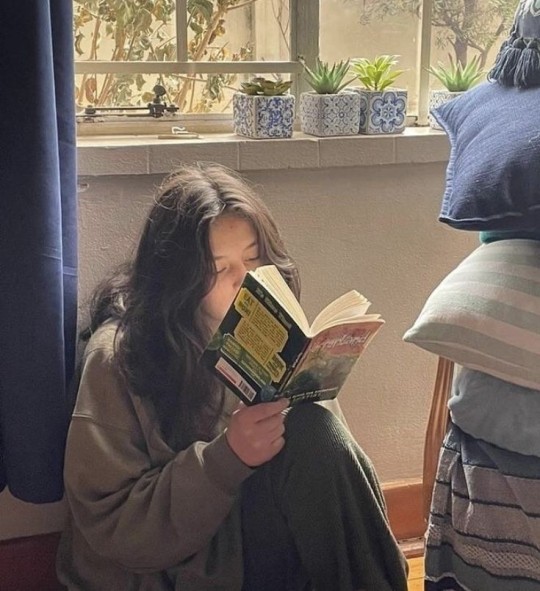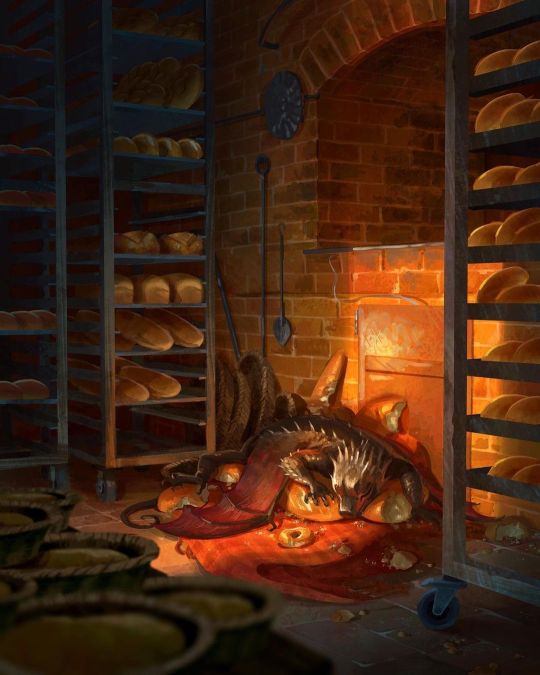Text
People sometimes wonder why the farmer in Stardew Valley has the strength of a giant and the will of a thousand men in order to make the old farm profitable and revive the dying town.
They're a twenty-something ex-Joja employee and they have just discovered free will for the first time in their life. If I had the caffeine addiction of a college student and the rage of a fallen god I could probably run a pretty good farm too.
5K notes
·
View notes
Text
[grabs your shirt] listen. listen to me. the practical is holy. the everyday is sacred. the simple act of surviving is divine. do you get it? sanctity begins at home, in the hands that build and the lives we live and the deaths we die and the worms that eat our bodies. if making something by hand is not worthy of veneration then nothing is.
69K notes
·
View notes
Note
Are you interested in anybody at the moment?
my future self, imma give that bitch the whole goddamn world
137K notes
·
View notes
Text
*flirts with you by offering to download academic articles for you using my institutional access*
11K notes
·
View notes
Text
be the decadent, cold-hearted brunette you want to see in the world.
32K notes
·
View notes
Text
the person reblogging this from you is rooting for you to have a happy, healthy, and successfull 2022
98K notes
·
View notes
Text


Rest In Peace, Betty White (January 17, 1922 - December 31st, 2021).
Thank you for the laughs.
51K notes
·
View notes
Text
How to start!
Make some coffee/ tea / snack.
Instead of spending hours procrastinating on your phone, watch a motivational video while you eat.
Tidy your study space, get rid of dishes, mugs and anything that isn´t study related. Leave your glass of water.
Go wash your face with cold water.
Check time.
Turn off your phone and computer. If your study material is there, turn the wifi off.
Study.
Take a short break. (Go to the toilet, refill your glass, stretch, open a window, listen to music, talk to someone, call your mom, etc)
Follow this sequence four times.
Take a long break. (Get another snack, watch a motivational video, go on a short walk, read a book, do some yoga, take a shower, go outside, doodle, post something on tumblr, take a nap or whatever you´d like to do. DO NOT WATCH A TV SHOW YOU ARE NOT GOING TO STOP AND YOU KNOW IT PUNK. Also, make it so that your break doesn´t last longer that 25 minutes, don´t waste precious time)
Go back, keep studying.
15K notes
·
View notes
Photo

After finishing my fall semester, I have decided to compile some study strategies that will hopefully help any other college students out there (especially the premeds). These tips helped me get a 4.0 at an Ivy League school.
Cornell Note-taking is KEY. Especially if you use the question-answer format. For example, for my Biology class, I took notes on the lectures in the question-answer format. By covering one side with my hand and answering the questions out loud every day, I aced all the midterms and the final.
Study every day or at least most days. Trust me, cramming everything at the end is not fun. It may have worked well for a high school class but college classes have so much more material and it’s not worth it.
If you live on your college campus, I recommend finding a study spot that not many undergraduates or your classmates use. Whenever I go to the most popular study spot at my school, I can practically feel the stress in the air and I just cannot focus. On the other hand, if that kind of thing motivates you, go for it.
HYDRATE!
For papers and essays, write your drafts as early as you can and then go to your professor’s office hours. They will appreciate the time and effort you’re putting into the assignment. For my Writing class, I went to my professor’s office hours every week and kept asking her to look over my essay. I can guarantee I definitely wasn’t the best writer in that class but she appreciated the effort I put in and gave me an A.
For STEM courses or problem set heavy courses like Econ or Math, practice problems and office hours are so important. If you have practice problems in your textbook, do ALL OF THEM. I know it sucks and it can be terribly boring but it will pay off! Also, if you do not understand something on your homework, go to the professor’s office hours. Most of the time, you and the professor will solve it together and then you will definitely have the right answer (This is so perfect if your homework is graded on accuracy rather than completion).
Be friendly to the TA. Even if you are going to miss a recitation or two, make sure you ask questions and participate in the ones that you attend. That way, the TA will recognize your face when it comes time to put in your participation grade or give you a bonus point or two on your exam.
When you are in class, especially large lecture halls where the professor cannot see what you are doing, turn off your phone or put it on silent. Then stuff it in the deepest part of your bag. Do not look at it until the lecture is over. If you take notes on the computer, turn off your WiFi and take notes on Word.
Life is too short not to party a little. Remember to spend some time with your friends or go out every once in a while. I have found that taking a few nights off helps keep me from becoming burnt out.
Always remember that you are extremely lucky for being able to get an education. There are thousands of people who do not have this kind of opportunity. College can definitely be hard and I have had some bad days but in the end, mistakes help you learn. It is better to fail at something new you tried than never do it at all and never learn from it.
Thanks for reading! Hope you all have a wonderful Spring semester!
5K notes
·
View notes
Text
How I Study @ College
Hey everyone! Here are some quick general tips about studying successfully that I’ve learned from experience! I’m currently a rising senior at my university and figured I could help out some incoming freshman :) I go to a very small university with the average class size of 25 so these might not all apply to larger schools. This is my very first study tips post, hope you like it!
1. Study Groups - Some of your classes will have TAs; use them - they’re there to a) grade your assignments and b) hold study groups. Get in contact with them ASAP and find out their plans for the semester so you can add the study sessions to your planner! For the classes that don’t have TAs: schedule your own study sessions! Pass around a sheet of paper with info @ the top (possible times/locations) and ask for names/emails/#s of anyone interested in weekly study groups. This shows initiative and is a great way to make friends who are focused on studying like you!
2. Library - I know it’s tempting to study on your bed, but DON’T!!! It makes it harder to sleep because your neurons are actually changing their connections and associating things other than bed=sleep which is BAD! I occasionally use the desk in my room for arts and crafts, but I prefer going to the library for studying for so so so many reasons:
My library has lots of windows and I find it easier to study with all the natural light
Looking around, everyone is there to work, which is motivating in and of itself
If you have a noisy roommate, the library is a literal life saver, trust me
Just don’t study in your dorm. Don’t do it. Dorm rooms are too small and full of distractions.
At the beginning of the school year we can sign up to keep a desk on the mezzanine where we can leave our study materials/anything we want; not only is this time saving, but it also saves desk space in my room. Find out if your library offers anything like this!
The staff are very friendly and always help if I need to find certain articles or books - they help me get the gears going for research projects :)
The library is usually the quietest place on campus and I love the atmosphere so much
3. Sleep and study time - When I was a freshman I was constantly saving all my homework until 10pm which resulted in me being tired, grumpy, and getting bad grades. If you have later classes (10am or later) I suggest setting aside an hour or two in the morning for studying. Last semester I had an 8am class on Mondays and Wednesdays, but I wanted to keep a consistent sleep schedule so I studied starting at 8am the other school days too. I plan each school day hour by hour, every day. I never stay up past midnight on a school night - always try and get 8+ hours of sleep!
4. Print the Syllabus - you want to have all your syllabuses on hand if possible - print them, write the dates in your planner, put sticky notes all over your wall for each class, whatever you need to do. There is no good excuse for turning in assignments late because you forgot the due date. Some professors will give ZEROS on late assignments. Don’t let that poor kid whose grade drops a letter just because of homework be you.
Good luck to anyone starting college in the fall!
2K notes
·
View notes
Text
7 Tips to Survive College
1. Learn how to prepare your classes in advance
Even if your professor doesn’t demand a pre planned class, discipline yourself and make some preliminary readings and notes. These will help you learn the material at a healthier pace, turning your classes into a more interactive experience.
2. Plan your readings and assignments when the semester begins
Large tasks can be broken into smaller ones. Scheduling reading sessions is a great way to make sure you can tackle a large textbook by the end of your semester. Aim for a chapter or half-chapter per session. The fact that you are focusing solely on a small portion of text rather than stressing about having to read 100+ pages per day will make you retain the information easily and learn in a more constructive way. Plan for the whole semester and, even if the reading rhythm your teacher demands is different than what you’ve planned, tell yourself that you are self-learning instead of following self-imposed classes. Learn how to make the most out of your readings here.
3. Know when to skip classes and when NOT to skip classes
Some classes are actually better skipped. You need to make a mature and rational decision if you decide to skip you classes. Ask yourself: is this class improving my learning on this subject? Isn’t this class robbing me of my time to tackle my assignments in a more organized way? Can I find the in-class information in other materials, like textbooks, notes or syllabus’?
4. Keep a list for questions and topics on difficult subjects
Keeping these neatly summarized into topics in paper is actually a BIG stress reducer. Condense your biggest insecurities into a notebook and work your ass off to cross them out of your list. You will have an incredible feeling of achievement when you reach the end of your list and (who knows?) you will become specialized in those topics.
5. Aim for study groups with a maximum of 3 people
Studying in group is a fantastic boost for your leaning capabilities: saying your content out loud and explaining it to someone else with your own words makes you learn your subject rather than memorizing it. However, if you are in a crowded room or are studying with more than 3 people, your attention spam will become reduced and you won’t focus as easily.
6. Invest in good quality time with yourself
It’s incredibly hard to focus during a study session if you feel unhappy or are constantly thinking about the show that you’ve been avoiding during the entire week. Spend an hour pampering yourself. Brew your favorite beverage and watch one or two episodes of Netflix. Make your study breaks worth it. Do things that you love so you can tackle your assignments with extra motivation.
7. Learn how to manage your time
Going to college doesn’t mean that your social life will disappear or that you won’t manage to sleep eight hours a day. In fact, I guarantee you (after three years in Law School myself) that you don’t need to stop doing anything you were doing before. You can sleep eight hours a day, go to the gym, hang out with your friends and (yes), even watch Netflix.
You just need to learn how to manage the various aspects of your life in an intelligent way. Instead of watching a Marathon of Pretty Little Liars, watch one or two episodes a day, at scheduled time.
Learn how to turn off your brain at night – regardless of the tasks you still need to tackle, think about going to bed at the same hour, each night. Aim for those 8 hours that will give you the boost of energy you need to be much more productive in the morning. Invest in good quality time with your friends and with yourself – plan something fun, using the same creativity you would use for your studies.
Make each second count and you’ll be surprised to find out that you can study less and achieve better results when you have a happy outlook on life. Learn how to maximize your study sessions here.
810 notes
·
View notes
Text
{Study Tips #2 Techniques for Memory & Recall}
🗝 Association This is a scientifically proven way to improve memory and recall of new material. It’s a fun way to remember things by associating them with another thing, word, sound, concept, etc. For example, when I was learning about fossils and prehistoric life, I remembered what a trilobite was by associating it with the phrase “trillion bits” because it looks like it has a trillion bits stuck together to make it one larger bit (if you don’t know what a trilobite is or looks like and are completely confused about what I’m talking about, look it up in google images 😂).
🗝 Repetition Another scientifically proven tactic to help in memory and recall, and probably the more obvious technique to use. Research shows that learning in short bursts and testing knowledge repeatedly has a significantly greater affect on long-term recall.
🗝 Mnemonic Devices This is one of my favorite ways to remember things. A mnemonic device is a learning technique used for memory & retrieval (recall). There are different types of mnemonics:
Music mnemonic: catchy songs or jingles that can anhance rhe ability to remember information long-term. Ex: the ABCs song.
Acronym mnemonic: first letter of each word (especially of a list) is combined to make another acronym (such as YMCA or EPA). Ex: colors of the rainbow make ROY G BIV.
Word/Expression mnemonic: similar to the last, but the first letter of each word is used to make another word or expression. Ex: the first letter of each word of the taxonomic levels makes the phrase King Phillip Came Over For Great Spaghetti
361 notes
·
View notes
Text

Summary of Marty Lobdell’s lecture (watch it here) about the most effective study techniques.
1. TAKE BREAKS.
25-30 min of studying, followed by 5 min break (a.k.a. pomodoro technique). Once you get used to the load of studying, you can increase your time of one study session, just follow this rule:
“The moment you start to slide, you’re shovelling against the tide, what you need to do is what? Take a break.”
When you study for long periods of time, without breaks, your focus drops and you end up learning very little if anything at all. Breaks keeps you re-energised and focused.
2. REWARD YOURSELF AFTER EVERY STUDY SESSION.
”Things that are reinforced, we tend to do more of. Things that are punished or ignored, we tend to do less of.”
To put it simply, rewarding yourself after every study session will make you more likely to study more as your brain seeks rewarding activities.
3. GET A STUDY ENVIRONMENT.
Everybody has special rooms for sleeping, food making, bathing, etc., but who has a room for studying?? Not many. Well, obviously, not everyone can afford one, but there’re some tricks, which will help you to create a study environment.
Get a study lamp. ONLY turn it on while studying. DO NOT use it for other purposes.
If you’re studying in a room, which has bed (bedrooms, dorm rooms…), turn your desk away from your bed to face a blank wall.
The context provided by environmental cues largely determines your behavior, so create a study environment, which encourages you to study. Distracting cues’ examples: bedroom - sleeping cues (bed), kitchen - food cues, living room - TV, radio, people, etc. All these distractions prevent you from studying!!
4. KNOW THE CONCEPTS, NOT THE FACTS.
For example, it is like knowing the words of a song but not knowing what a song is about. FACTS = song lyrics, CONCEPT = song meaning.
Facts can easily be looked up if needed.
5. USE STUDY GROUPS.
They’ll keep you motivated and accountable.
6. NO HIGHLIGHTING.
Or at least no highlighting after reading a text once as highlighting tricks your brain into thinking that you memorised the thing, when, in reality, you didn’t.
7. TAKE NOTES.
Take notes during your class/lecture/etc.. After the class is finished, take out your notes the first free moment you’ve got and expand everything you’ve written. Give it some depth. If you do that like 2 (or more) hours after the class, you will have forgotten much of what you had written. So do this asap.
8. TEACH. TALK OUT LOUD.
One study showed that best way of studying is to do 80% of reciting and 20% of reading. So, teach others what you’ve learnt or dialogue with empty chairs if you have no one to teach. What you can teach, that you understand.
9. STUDY TEXTBOOKS USING SQ3R METHOD
Survey - go through an entire chapter, look at the pictures, graphs, questions…
Question - While surveying, you might get some questions. If not, then ask yourself questions like: “What’s this?”, “What does this graph mean?”… This will cause you to look for answers and “if you intend to find something, you find it.”
Read - (20% of time)
Recite - (80% of time)
Review - after some time has passed.
10. USE MNEMONICS FOR FACT MEMORIZATION.
Because sometimes concept learning is not enough. :( Make acronyms, coined sayings, or interacting image associations to help yourself remember the facts. The weirder, the better.
460 notes
·
View notes























